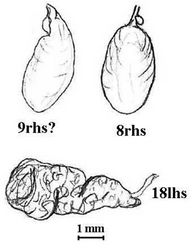Anisochaeta animae
| Notice: | This page is derived from the original publication listed below, whose author(s) should always be credited. Further contributors may edit and improve the content of this page and, consequently, need to be credited as well (see page history). Any assessment of factual correctness requires a careful review of the original article as well as of subsequent contributions.
If you are uncertain whether your planned contribution is correct or not, we suggest that you use the associated discussion page instead of editing the page directly. This page should be cited as follows (rationale):
Citation formats to copy and paste
BibTeX: @article{Blakemore2011ZooKeys160, RIS/ Endnote: TY - JOUR Wikipedia/ Citizendium: <ref name="Blakemore2011ZooKeys160">{{Citation See also the citation download page at the journal. |
Ordo: Haplotaxida
Familia: Megascolecidae
Genus: Anisochaeta
Name
Anisochaeta animae (Lee, 1959) – Wikispecies link – Pensoft Profile
- Megascolex animae Lee, 1959: 281, figs. 301-304.
- Anisochaeta animae; Blakemore, 2004, 2005, 2010.
Distribution
From Unuwhao Mt., nr Spirits Bay, northern extremity of Northland, NZ.
Description from type
AMNZ 5038 for Megascolex animae has the following label in jar: “Unuwhao nr. Spirits Bay, N.Z. Coll: A.W.B.P. Feb 1946 AM8 1039”. It is a substantial specimen – 196 mm × 13.5 mm – collected by former director of Auckland Museum, A.W.B. Powell in Feb. 1946. Although the specimen in alcohol is now bleached of its earlier dark brown dorsal pigmentation and is wrinkled and hardened, it is yet well preserved. Reinspection of the type largely conforms to Lee’s original except that his figured spermathecae (from 9rhs that he included in a separate vial) is broken off after the diverticulum, and diverticula are newly found to be present in the remaining in situ spermathecae (see figure). The peristomium was not obviously cleft ventrally and genital markings, rarely described by Lee, were not found, but dorsal pores were: small in 4/5 and more obvious afterwards. Specimen AMNZ 5038 is the monotypic holotype fixed by original designation under (ICZN, 1999[1]: Art. 73.1.1); the only slight ambiguity is that Lee (1959[2]: 282) also noted another specimen with “Same data as type material” that has not been subsequently located.
Taxon Treatment
Other References
- ↑ ICZN (1999) International Code of Zoological Nomenclature. 4th edn. Published by the International Trust for Zoological Nomenclature, c/o Natural History Museum, Cromwell Road, London, SW7 5BD, UK.
- ↑ Lee K (1959) The earthworm fauna of New Zealand. New Zealand Department of Scientific and Industrial Research Bulletin 130, 486 pp.
Images
|
